Why Is My Rabbit Not Eating Pellets? Nursing Pets
Is your rabbit not eating pellets? Does he flip the pellet bowl over? Or, does he let the pellets stay in the bowl all day? There could be some reasons why rabbits might not be eating pellets at all or for a few days.
Now, you’re probably wondering, why is my rabbit not eating pellets? Your rabbit might be bored with pellets because of eating the same ones day after day. Maybe, he has some dental issues, and the pellets hurt his teeth. In addition, he may have already consumed too many pellets.
Apart from that, a few reasons are out there why rabbits don’t eat pellets. In this article, we’re going to talk about all that. Once finished reading this, you can check out another article on the reasons rabbits are scared of their owners.
Related Blog: Why Does My Rabbit Climb On Me? Read now
Why Do Rabbits Stop Eating Pellets?
If your rabbit stops eating pellets, it can still be a good idea to know why the food is no longer appealing. You should take your bunny to the doctor if there is a medical reason. However, here are some reasons why a rabbit may stop eating pellets.
1. Poor Quality Pellets
Rabbits are relatively picky eaters. And rabbits need the pellets specially made for them. If you provide your bunny with cheap pellets (mixed with nuts and other stuff), he may not get the real flavor and won’t be willing to eat them.
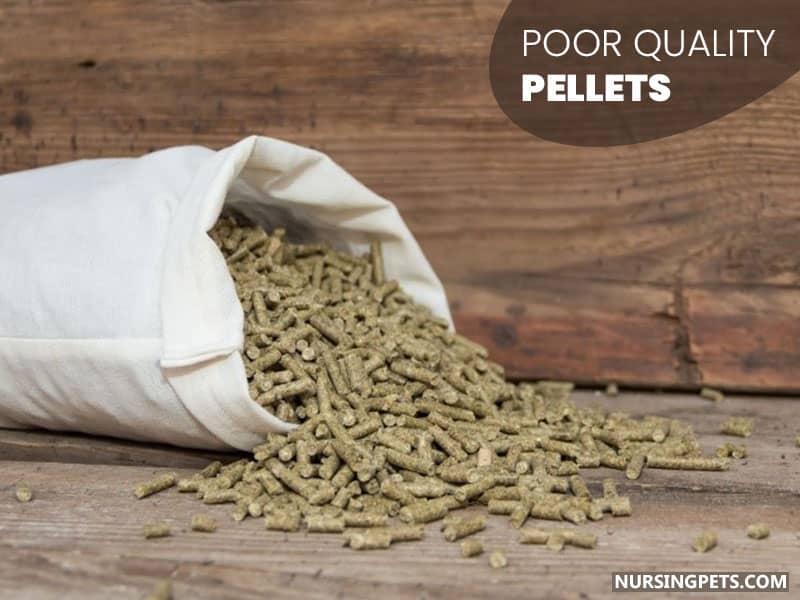
In addition, poor quality pellets lack the nutritional benefits your rabbit actually requires, leading him to feel sick. Don’t give your bunny the pellets of unknown brands. They’re usually the modified versions of other animal feeds with a lower calcium content.
2. Moldy, Dusty, or Expired Pellets
The pellets you offer to your bunny could get stale. Pellets can also be moldy if you buy them in bulk, especially those from the bottom of the bag. Don’t keep your old pellets for more than 6 months, counting from the day you opened the pack.
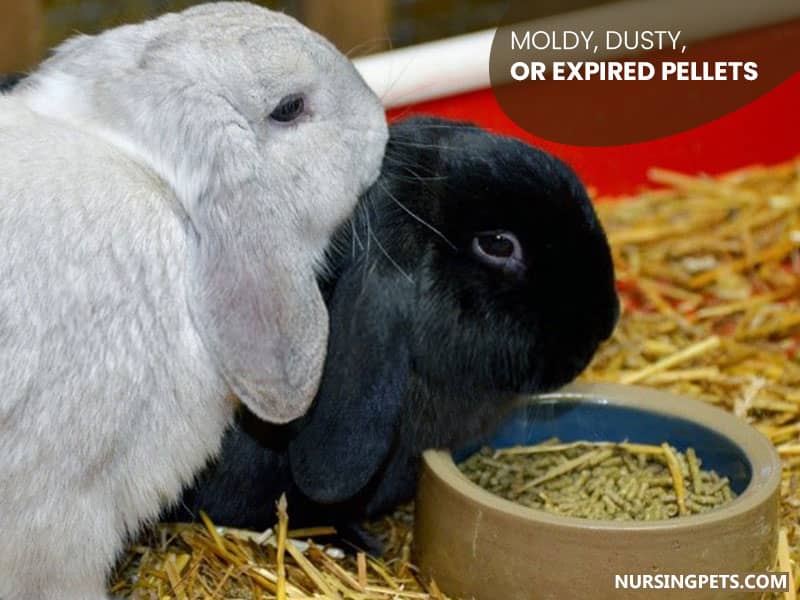
On top of that, the pellets you just bought could already be expired or smelly to your rabbit. And rabbits don’t usually consume anything that smells bad. Aside from that, you shouldn’t purchase high-in-protein pellets because they can quickly be moldy.
3. Teeth Issues
Do you know rabbits need to keep their teeth trimmed? They usually do that by chewing toys and eating fibrous foods. If their teeth become too long, they may feel pain and have to be picky eating food.
The symptoms of dental problems are:
- Change in food preferences
- Decrease in food consumption
- Overflow of tears from the eyes
- Weight loss
- Bad breath
- Pain
- Lack of grooming
- Digestive disorders
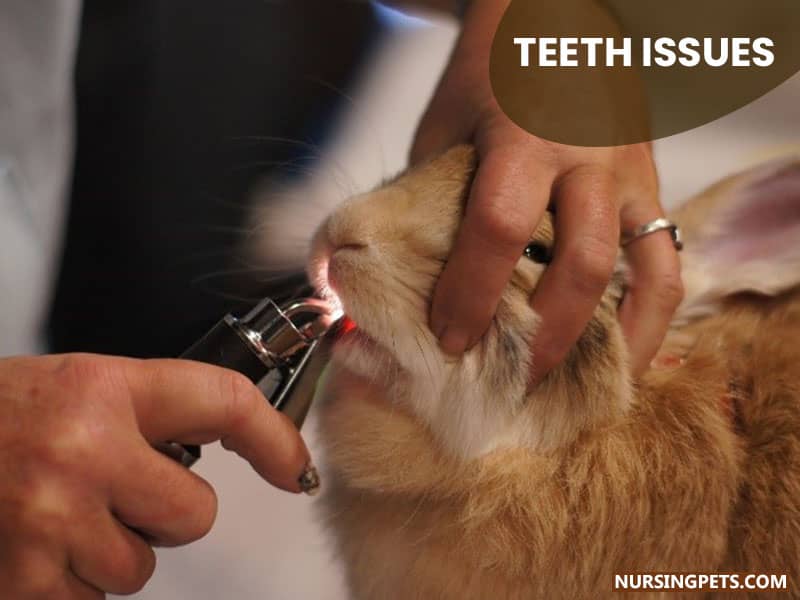
Telling about a rabbit having dental issues is really difficult. Rabbits hide their pain not to invite predators. Temporarily, you can add a little water to the pellets to check if he eats or not. Contact a vet if you suspect something serious.
4. Too Many Treats
Your rabbit may not be eating pellets because you may offer him too many treats, and he may have no hunger for them. Maybe, your rabbit has already consumed a lot of hay and veggies. That’s why he is ignoring to eat the pellets.
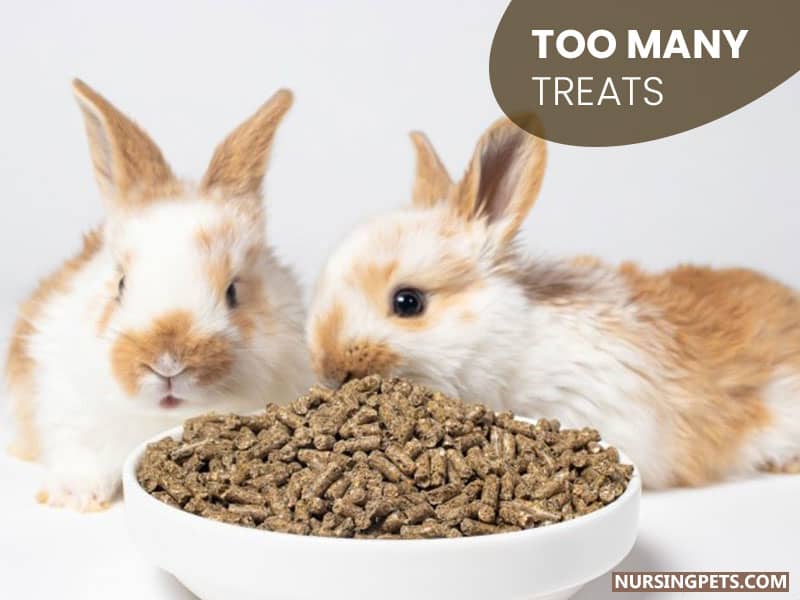
What can you do to entice him to eat pellets? First of all, don’t give your bunny too many snacks. Your bunny may turn his attention to the pellets again. Tasty snacks are not only full of sugar but don’t have enough nutrients your bunny actually needs.
5. Bored of Eating the Same Food
If you notice your bunny not eating pellets, this might be because he is bored of eating the same pellets every day, finding them dull and tasteless. In order to turn his interest in the pellets, switch up brands or flavors to check if he eats more or not.
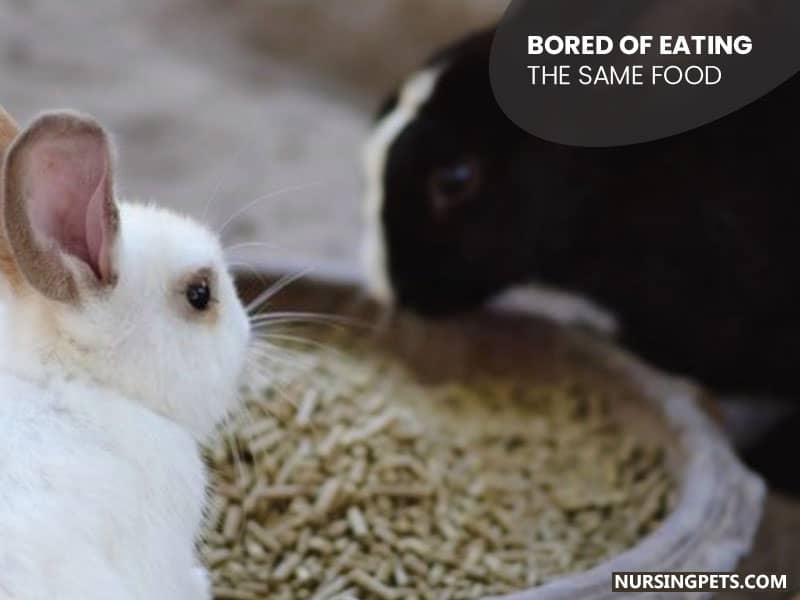
Try the new brand or flavor slowly, mixing a little with his old pellets. If you provide your bunny with the pellets of new brands or flavors, his stomach may not be adjusted to them. Mixing the new pellets with the old ones will prevent any intestinal issues.
Here are some pellets for you: (All links take you to Amazon)
- Oxbow Essentials Rabbit Food (Click here)
- Kaytee Timothy Complete Rabbit Food (See more)
- Small Pet Select Rabbit Food Pellets (Check price)
6. Stomach Hurts
If your bunny is not eating pellets even if his teeth are all right, then he might be having a stomachache. How do you understand your bunny has a problem with his stomach? The symptoms to look out for include:
- Constipation
- A swollen, distended abdomen
- Hiding in the corner
- Grinding his teeth
- A reluctance to move around
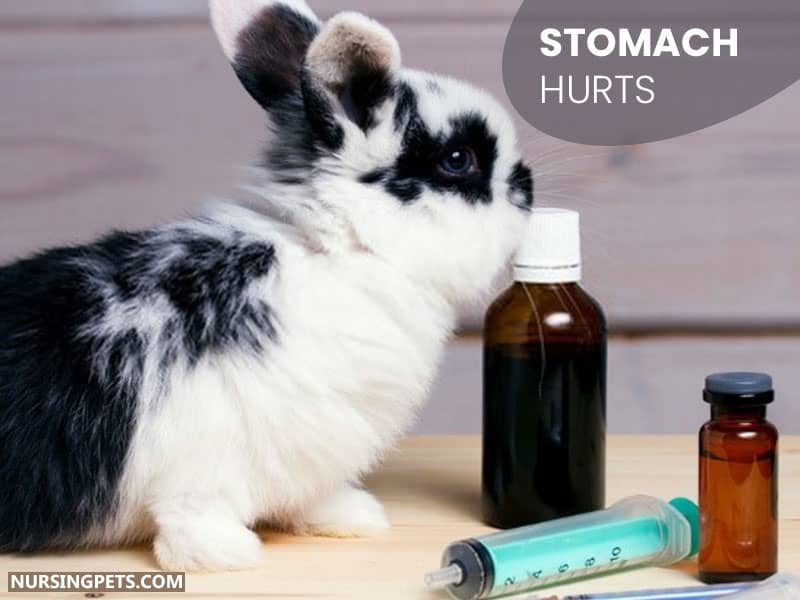
Keep in mind that, if your bunny consumes hay, he won’t have an intestinal blockage. However, the symptoms mentioned above suggest your bunny is in severe pain. If your bunny has a serious stomachache, contact a vet as soon as possible.
7. Tainted Food
If rabbits feel something unwanted in their pellets, they won’t be willing to eat from the bowl. So, if you notice your bunny is not eating pellets, he may have peed on the food. Maybe, a mate may have urinated on the pellets to show dominance.
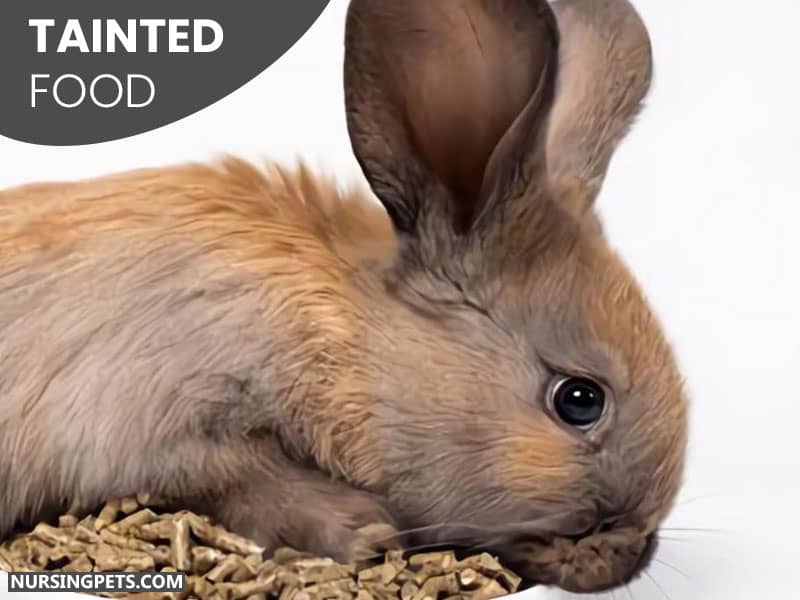
If the smell of rabbit urine comes from the pellets, change the pellets as soon as possible. Before refilling with the new batch, wash the bowl thoroughly. Once your bunny sees that the bowl is clear, he might consider eating from that.
Do Rabbits Really Need Pellets?
Your rabbit doesn’t really need pellets because wild rabbits never eat them. Besides, pellets could be only 5% of your rabbit’s diet, whereas 80% of his diet is hay and vegetables. Keep in mind that rabbits don’t need to consume pellets once they reach adulthood.
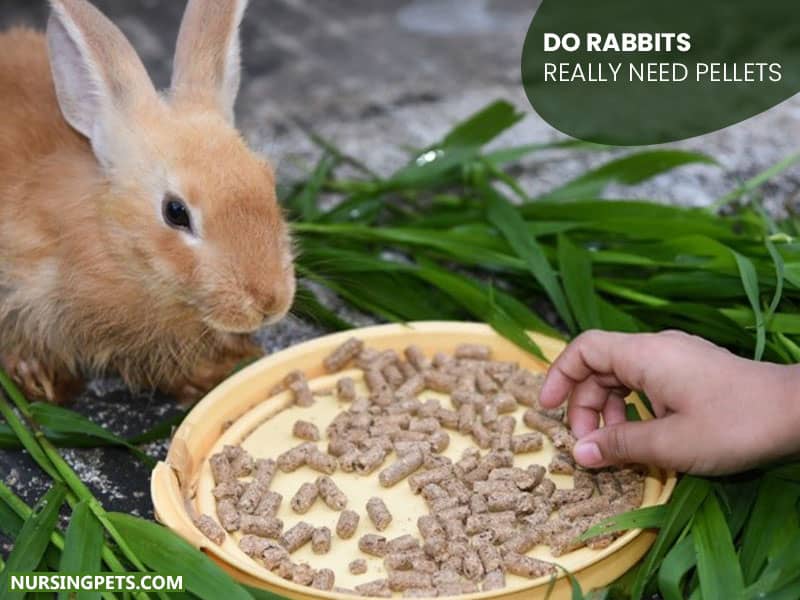
And baby rabbits can grow with pellets. By the way, if your bunny has stopped eating pellets, feed him hay and fresh, leafy green vegetables. If you notice any change in your bunny’s diet, bring him to a veterinarian as soon as possible.
How to Convince Your Rabbit to Eat Some Pellets?
If you’re willing to feed your rabbit pellets, what should you do? In this section, we’re going to talk about how to convince your bunny to eat some pellets. Here we go!
1. Give His Favorite Snacks at First
Is your bunny not eating his pellets? At first, give him a few yummy, yet healthy snacks sprinkled on the pellets. He will surely be willing to eat the snacks and then the pellets. Don’t offer hay or leafy vegetables if you really want your bunny to eat pellets.
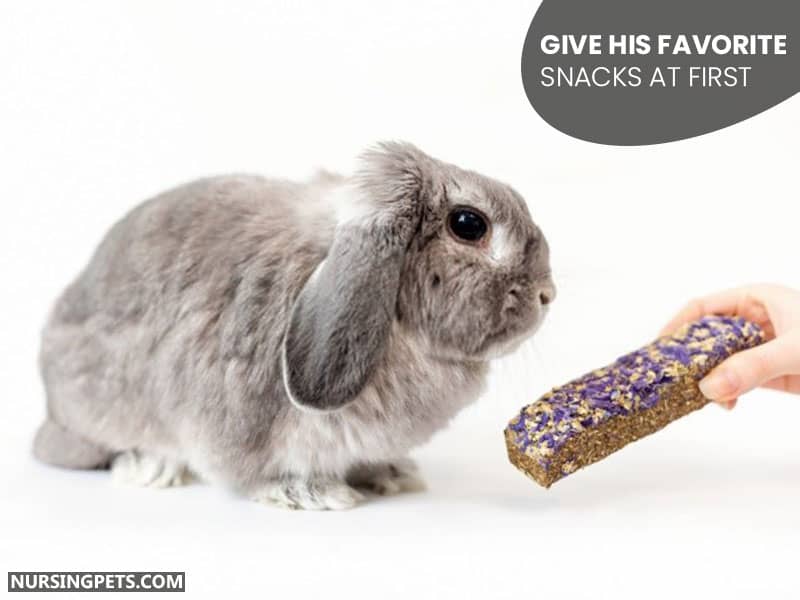
Does your bunny like to eat a variety of fruits? You can give him a few slices of apples, bananas, melons, oranges, etc. Make sure that your bunny is hungry enough to eat some of his pellets after consuming the fruit slices.
2. Follow a Specific Pellet Time
Another way to convince your bunny to eat pellets is to give his pellets only at a certain time of the day. As per six pounds of body weight, rabbits usually require about a quarter-cup to a half-cup of pellets a day.
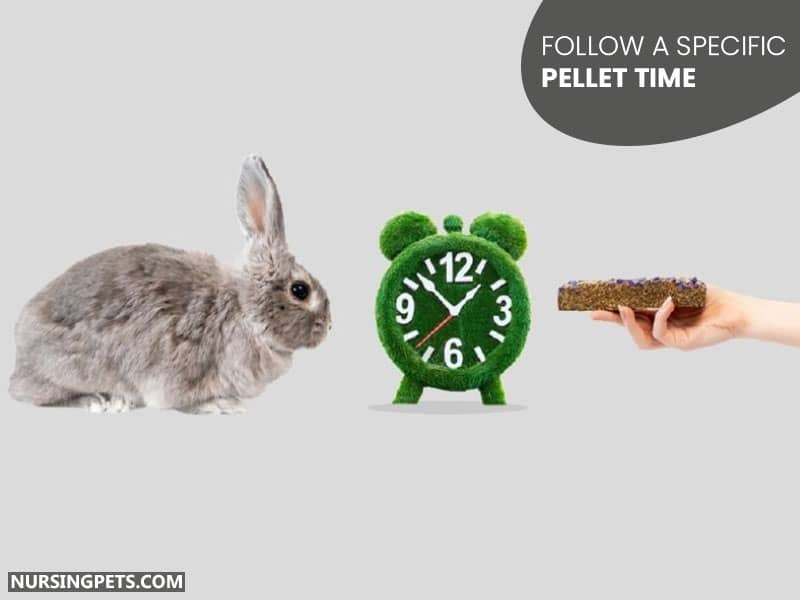
Instead of giving him all the food together, make a schedule to feed him a few pellets. Once he has played for a long time, we think this is the best time to give him some pellets. Hopefully, he won’t be bored of eating the pellets at all.
3. Eat Some Pellets Yourself in Front of Your Rabbit
To convince your bunny to eat pellets, you should eat some of them. Although they won’t be delicious, they won’t be harmful to you. Once your bunny understands that the pellets belong to you, they get more appealing to your bunny.
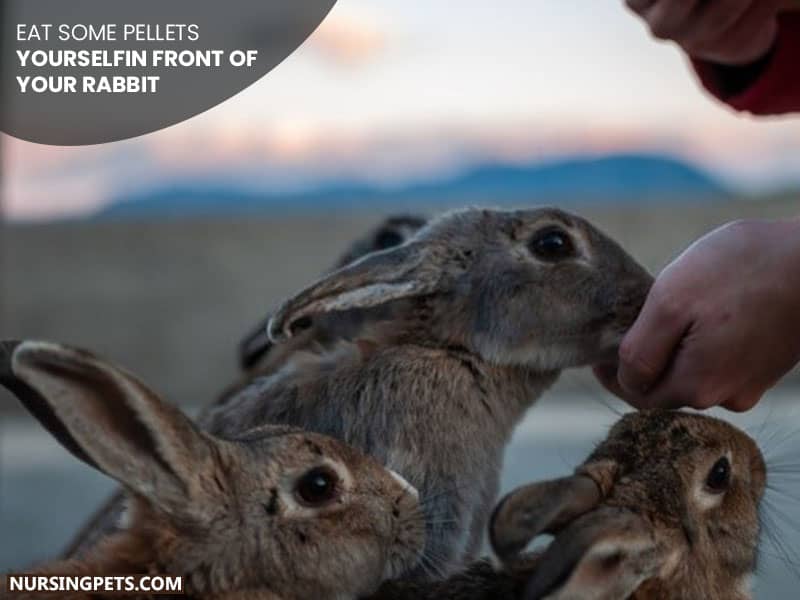
You can also give your bunny some pellets in private, away from a mate. This may increase the interest of your bunny in the pellets. Since rabbits love sweet tastes, smear a little jam on the pellets. Your bunny will be surprised to have a delicious dish.
What Makes an Ideal Rabbit Pellet?
There are a few key qualities an ideal rabbit pellet should have. If you’re planning on feeding your bunny appealing pellets, make sure that the pellets are of high quality. Good quality pellets should have:
- Freshness: Since pellets can be stale, you shouldn’t keep them stocked more than 6 weeks after opening the package.
- Fiber: The pellets you’re going to give your bunny should contain 18% or more fiber if possible.
- Protein: Pellets should have 12 to 16% protein. For adults, pellets should contain 12 to 14% protein. However, 16% protein will be better for the young.
- Fat: Pellets should contain as low-fat content as possible. The maximum amount is 5%. Make sure to keep the percentage half of that.
- Calcium: The pellets you will give your bunny should contain no more than 1% calcium content.
Make sure to use grass-based ingredients in the pellets for boosting your bunny’s digestion. Don’t use dried fruits and nuts in the pellets. Your bunny will eat the delicious content and ignore the healthy ingredients.
What Can You Feed Your Bunny Besides Pellets?
If your bunny is not willing to eat pellets at all, what can you feed him instead? The best alternative food is leafy green vegetables. If you provide him with leafy greens, he will obtain the necessary calcium and protein he would get from pellets.
The most common leafy green vegetables are:
- Arugula
- Basil
- Chicory
- Watercress
- Swiss chard
- Sprouts
- Spinach
- Parsley
- Mache
- Mint
- Fennel
- Kale
- Lettuce
Final Words
Now that you know why your rabbit is not eating pellets, you should convince him to eat some of them. Give his favorite snacks at first or smear a little jam on the pellets. Besides, you can try some leafy greens if your bunny doesn’t have any interest in pellets.
Hopefully, you learned a lot about why rabbits don’t usually want to eat their pellets. If you’ve ever encountered this problem, is there anything different (we didn’t mention) you tried to your bunny? Comment down below. Follow us on Pinterest, and Twitter.
Image Sources:
- Istockphoto.com
- Stock.adobe.com
- Flickr.com
- Alamy.com

